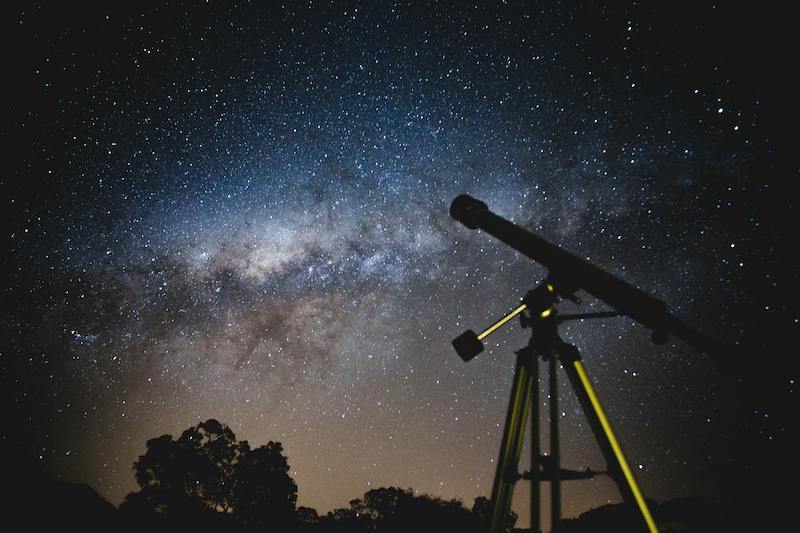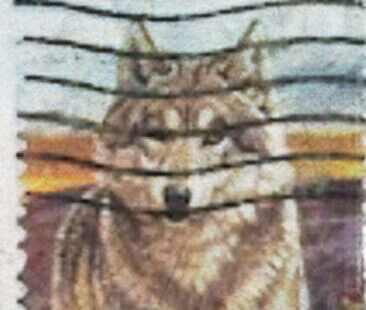Jo Balistreri
Two Favorite Haibun
Visions of fatherhood, and the opening of new worlds

One of my favorite haibun is “Winter Gift” by Doris Lynch, in which Lynch remembers how her father opened up the universe to her. I appreciate not only its theme of wonder, which she evokes beautifully, but also the specific strategies used to convey that amazement. Lynch excels of the most important aspects of storytelling—call it rhythm, timing, or pacing, she knows how to ease the reader into the story.
Winter Gift
One night Dad comes home from work with something long and skinny wrapped in brown packaging. He hauls it down to his workshop, commanding us to stay away—he has a surprise for nighttime. We eat dinner and newly bought but still green bananas for dessert. Dad won’t offer a single clue and refuses to play along when we start a “Ten Guesses” game. Later we become engrossed in schoolwork and Tuesday night’s programs. The cellar door slams as Dad scurries back and forth.
At 9:30, Mom issues her first bedtime warning but Dad hollers, “Hold on, Marie, let me show them the surprise. Kids, don your coats and meet me in the backyard.”
hatbox chaos single mittens, ruffless scarves blast of wintry airWe galumph into the yard in wrong-sized boots that squeak as we cross the frozen snow. In the center of the yard, we can barely discern the outline of a white telescope on a tripod. We’ve only seen one once before at the Franklin Institute downtown.
Dad aims the lens at Saturn and allows us each a turn at the telescope in order of age. When my turn comes–I’m third–I peer into the eyepiece and see nothing, only a black sky empty of stars. Dad slowly points the lens higher and suddenly a whole sea of stars appears, all quavering. “Here, find Saturn with your naked eye, then steer the telescope toward it.” My hand jerks. The stars and planets lurch, but then slowly, I coax a pearly dot into view, encircled by three beautiful rings. “Holy Cow!” I yell, “They’re gorgeous. They’re huge. The bracelets of Saturn!”
above crystalline snow clouds of children’s breath intermingle
The title is simple and gives nothing away. Just two ordinary words: “Winter Gift.” These words lure the reader into the haibun with something familiar, an ease that continues with the first paragraph. Using straightforward, declarative sentences, Lynch unobtrusively weaves the theme of wonder throughout the paragraph. Even the father’s mysterious “surprise,” his reluctance to provide clues and play the “Ten Guesses” game, are presented as all part of an ordinary evening. Lynch creates a comfortable family rhythm.
The second paragraph starts differently. Abruptly. At 9:30, Mom issues a bedtime warning; Dad “hollers” commands. Mentioning the exact time interrupts the easy-going pace, and the father is now given a voice that activates the story.
Then the haiku—a rush of words that adds excitement. Form and function meld.
hatbox chaos single mittens, ruffless scarves, blast of wintry air
The third paragraph begins, “We galumph”-—a strong, active verb that propels the story forward. More strong verbs—”mismatched boots squeak across frozen snow”—ground us in the immediate, before everything stops when Lynch introduces the “surprise”: In the center of the yard, barely discerned, is a telescope on a tripod. “We’ve only seen one once before at the Franklin Institute downtown,” she says. These last two sentences pause the action, allow the reader to appreciate the wonder of the telescope, and imagine the wonders it might reveal.
Lynch leaps back into action—no transition—with the next paragraph: “Dad aims the lens at Saturn.” We are now far from the cozy family evening, and the father’s true intent now comes into focus along with the stars. When Lynch sees only a black sky, the father calmly points the lens higher. The child is awkward. Her father is patient. Much as the telescope focuses closer and closer, so does Lynch’s writing, until the child coaxes into view a “pearly dot … encircled by three beautiful rings.” Bursting with joy, the last sentences are short and direct.
“Holy Cow!”
“They’re gorgeous.”
“They’re huge.”
Finally, in complete awe: “The bracelets of Saturn!”
Lynch also chooses her words well, with three in the last haiku—crystalline, children, breath—connoting purity, innocence, and wonder. Through this memory of her father, Lynch not only captures a moment of awe, but also pays tribute to a parent who opened up a world beyond home and gave her the galaxies.
In my haibun “Day of Remembrance,” I too honored my father, who opened up a world to me that was far from the heavens but no less powerful.
Day of Remembrance
This Memorial Day is different. My father places a small carton of artifacts before me on the kitchen table—things I never knew he had. In seventy years, he deflected all questions about the war with “There’s nothing to talk about.” He’s in his nineties, and I wonder, why now?secrets out of the closet articles of warI dig out his aluminum dog tags, the size of half dollars; register the cold on my palm, wonder what it felt like around his neck. Letters from my mother, along with her picture and a lock of hair are enclosed within a heavy envelope. I put them back, leaving the letters for later. Remaining are two pocket-sized black books—Dad’s diaries.
I open to the slanted script, ink smeared in places, fragments rather than sentences—a decimated Japanese village, little kids lost, crying; bodies in the rice paddies, bodies huddled together in fear—killing them out of fear. His handwriting is trembly, and as I continue to the second book, I hear the uncertain, quivering voice that haunts these pages. I never heard my father cry. These books are full of tears.
brittle leaves falling from the trees ... my tea’s bitter tasteI stare out the window. Flags hang limp in the desert sun. The Sousa marches that stirred the morning air are now replaced by images, death-stilled and sun-hollowed. How do I reconcile the spirited music of patriotism with killing for one’s flag?
I continue with the second book, father’s handwriting almost illegible—names of the dead, of the wounded. I hear loneliness and loss, despite the entries about the band he sang with on board his ship. A picture unmoored from its scotch tape shows the young men in his group. All dead except my father.
eviscerated— the mouse no match for the hawkTogether in the living room, we finally talk about his war, his years of silence, my unknowing. How he’d been lost inside that war. He said coming home to a loving wife and two small children saved him. He’d been afraid, ashamed, beaten. Now in his last years, he wanted me to understand.
flowering Katsura in their midst my father’s shy smile
When I was growing up, Memorial Day meant family and friends, barbecues, and picnics. We had ice cream and sodas, as much as we wanted.
My dad was always at the grill, talking, laughing with the guys. He never discussed the war he fought in until the day he handed me his diaries. The books were a revelation. I hadn’t known my dad kept diaries of his time in Japan. Tears ran down my face as I read the fragments, saw his writing turn wobbly, saw the ink smeared.
For a long time that day, I sat looking out the window. The morning had been like my childhood, flags waving, parades, patriotic music on the radio. It felt meaningless after what I’d just read.
In the second dairy, Dad had dutifully entered the names of his dead unit. He was writing in a dead tone by now, almost perfunctory. Dad, being a musician, had organized a band on ship. He’d slipped a photo of the guys into his diary… all dead was his notation.
I knew even then that I needed to write about his memories, mine, and the war I’d never thought about. I’d hoped the writing would honor Dad—and this day.
I began with the prose—the power of secrets as a means of survival, as well as catalyst for the distance inherent in how our family communicated. I realized my dad wasn’t the easy-going guy I’d thought. A whole part of his life was missing. We never knew what he’d suffered, what he held.
At this point in the writing, I realized I wanted to add haiku, the poems being similar to those mementoes he’d saved: the dog tags, the lock of hair—each artifact like a haiku, capturing so much more than what the small object actually is. The haiku also carried conflicting emotions that didn’t fit neatly into the narrative: from stupefaction in the first haiku, to sadness in the second haiku, to anger in the third and then, finally, reconciliation.
The title came last, and I decided to go with “Day of Remembrance”… memories building upon memories, the day itself honoring all those who fought in the war, specifically my dad and those like him, who didn’t know how to break that stone of silence they’d buried. Looking back at that history—as if through a telescope—both the universe and my father became a little clearer.
Acknowledgments
“Winter Gift” originally appeared in contemporary haibun online 8.4, January 2013.
“Day of Remembrance” originally appeared in The Haibun Journal 1.2, 2019.
About the Author

Jo Balistreri has three published books of poetry and a chapbook. Even when “Jo” isn’t writing haiku she is thinking about it as it helps her to maintain a sense of gratitude and appreciation. She and her husband live in Duluth, Minnesota. Visit her at maryjobalistreripoet.com.

Wonderful comparative piece.
Such a stark contrast. Day of Remembrance is so very poignant. Every war leaves scars and scarred soldiers. Your dad carried his alone for so long but you honor him and his memory now by sharing it.
Thank you for writing Peggy. That was my hope and I’m so appreciative for your words.
Thank you so much, Jo, for your deep read of my haibun and for your finding and sharing parallels in out relationships with our fathers. My father never shared any of his war memories with me but they shaped his life in many ways, both good and bad. He did share his love of stars, and his curiosity about the universe. One night when I was a teen, he came home from work and shared with my mother, that we would never ever be able to leave our galaxy. I can still hear the disappointment in his voice. Love your “flowering Katsura” haiku too.